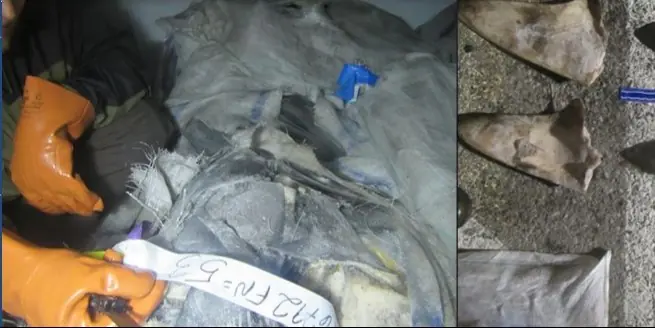Between 2021 and 2024, nine Japanese fishing vessels landed more than 17,000 kilograms of shark fins in 713 sacks at the port of Callao – even though Peru has banned the unloading of detached fins since 2017, regardless of flag or fishing grounds. According to an analysis of 83 inspection records and transshipment protocols, no seizures were ordered and the Environmental Prosecutor’s Office (FEMA) was not informed.
What the law requires – and what failed to happen
By law, “finning” is prohibited; sharks must be landed with fins attached. The regulation applies to both national and foreign vessels, even when the catch was made on the high seas. Normally, inspectors must monitor unloading, report violations, seize goods, and impose fines. In the documented cases, none of this happened – no proceedings were initiated and the Public Prosecutor’s Office was not notified.
“Shark fins have a higher market value than the meat – that is why Peru prohibits the unloading of detached fins,” emphasize legal experts.
Extent, species and origin
At least 9,000 kilograms of the fins came from the blue shark (Prionace glauca, globally “near threatened”), while another 8,000 kilograms were not specified by species in the records. Satellite data indicate fishing activities in international Pacific waters – irrelevant to Peru’s legal framework: unloading is only tolerated with fins attached.
Private actors with a history
The Japanese ships were represented by the maritime agency Gyoren del Perú SAC, which has already been fined more than 120,000 US dollars (including for suspected illegal fishing). The buyer of all the fins was Servicios Marítimos Santa Elena SAC, a company with relevant violations – including a sanction (2020) for importing shortfin makos (Isurus oxyrinchus) without CITES export documents.
Enforcement gaps and international dimension
The CITES Secretariat’s reviews in 2024 led to trade restrictions on certain shark and ray species from Ecuador; for Peru, improvements in control and inter-agency coordination were recommended. Experts are calling for stricter measures in Peru: more staff for environmental police and customs, consistent seizures, tangible requirements up to temporary export bans for non-compliant companies – and the removal of shark products from the customs clearance “green channel.”
“Laws are of little use if controls are lacking. Consistent seizures and mandatory reports to the Public Prosecutor’s Office are crucial,” warn environmental prosecutors.
Why it matters
The global fin trade creates strong incentives for illegal practices. Detached fins usually mean that bodies are discarded at sea – often while still alive. Strict fin-attached rules are therefore a key instrument against finning. The Callao case shows: without effective control, protection remains only on paper.




